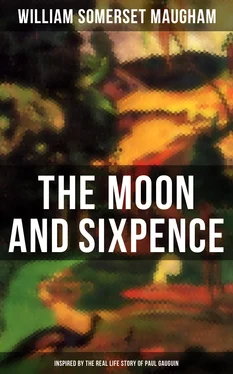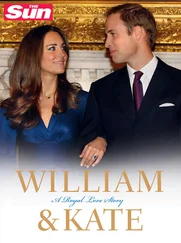Table of Contents
The season was drawing to its dusty end, and everyone I knew was arranging to go away. Mrs. Strickland was taking her family to the coast of Norfolk, so that the children might have the sea and her husband golf. We said good-bye to one another, and arranged to meet in the autumn. But on my last day in town, coming out of the Stores, I met her with her son and daughter; like myself, she had been making her final purchases before leaving London, and we were both hot and tired. I proposed that we should all go and eat ices in the park.
I think Mrs. Strickland was glad to show me her children, and she accepted my invitation with alacrity. They were even more attractive than their photographs had suggested, and she was right to be proud of them. I was young enough for them not to feel shy, and they chattered merrily about one thing and another. They were extraordinarily nice, healthy young children. It was very agreeable under the trees.
When in an hour they crowded into a cab to go home, I strolled idly to my club. I was perhaps a little lonely, and it was with a touch of envy that I thought of the pleasant family life of which I had had a glimpse. They seemed devoted to one another. They had little private jokes of their own which, unintelligible to the outsider, amused them enormously. Perhaps Charles Strickland was dull judged by a standard that demanded above all things verbal scintillation; but his intelligence was adequate to his surroundings, and that is a passport, not only to reasonable success, but still more to happiness. Mrs. Strickland was a charming woman, and she loved him. I pictured their lives, troubled by no untoward adventure, honest, decent, and, by reason of those two upstanding, pleasant children, so obviously destined to carry on the normal traditions of their race and station, not without significance. They would grow old insensibly; they would see their son and daughter come to years of reason, marry in due course—the one a pretty girl, future mother of healthy children; the other a handsome, manly fellow, obviously a soldier; and at last, prosperous in their dignified retirement, beloved by their descendants, after a happy, not unuseful life, in the fullness of their age they would sink into the grave.
That must be the story of innumerable couples, and the pattern of life it offers has a homely grace. It reminds you of a placid rivulet, meandering smoothly through green pastures and shaded by pleasant trees, till at last it falls into the vasty sea; but the sea is so calm, so silent, so indifferent, that you are troubled suddenly by a vague uneasiness. Perhaps it is only by a kink in my nature, strong in me even in those days, that I felt in such an existence, the share of the great majority, something amiss. I recognised its social values, I saw its ordered happiness, but a fever in my blood asked for a wilder course. There seemed to me something alarming in such easy delights. In my heart was a desire to live more dangerously. I was not unprepared for jagged rocks and treacherous shoals if I could only have change—change and the excitement of the unforeseen.
Table of Contents
On reading over what I have written of the Stricklands, I am conscious that they must seem shadowy. I have been able to invest them with none of those characteristics which make the persons of a book exist with a real life of their own; and, wondering if the fault is mine, I rack my brains to remember idiosyncrasies which might lend them vividness. I feel that by dwelling on some trick of speech or some queer habit I should be able to give them a significance peculiar to themselves. As they stand they are like the figures in an old tapestry; they do not separate themselves from the background, and at a distance seem to lose their pattern, so that you have little but a pleasing piece of colour. My only excuse is that the impression they made on me was no other. There was just that shadowiness about them which you find in people whose lives are part of the social organism, so that they exist in it and by it only. They are like cells in the body, essential, but, so long as they remain healthy, engulfed in the momentous whole. The Stricklands were an average family in the middle class. A pleasant, hospitable woman, with a harmless craze for the small lions of literary society; a rather dull man, doing his duty in that state of life in which a merciful Providence had placed him; two nice-looking, healthy children. Nothing could be more ordinary. I do not know that there was anything about them to excite the attention of the curious.
When I reflect on all that happened later, I ask myself if I was thick-witted not to see that there was in Charles Strickland at least something out of the common. Perhaps. I think that I have gathered in the years that intervene between then and now a fair knowledge of mankind, but even if when I first met the Stricklands I had the experience which I have now, I do not believe that I should have judged them differently. But because I have learnt that man is incalculable, I should not at this time of day be so surprised by the news that reached me when in the early autumn I returned to London.
I had not been back twenty-four hours before I ran across Rose Waterford in Jermyn Street.
"You look very gay and sprightly," I said. "What's the matter with you?"
She smiled, and her eyes shone with a malice I knew already. It meant that she had heard some scandal about one of her friends, and the instinct of the literary woman was all alert.
"You did meet Charles Strickland, didn't you?"
Not only her face, but her whole body, gave a sense of alacrity. I nodded. I wondered if the poor devil had been hammered on the Stock Exchange or run over by an omnibus.
"Isn't it dreadful? He's run away from his wife."
Miss Waterford certainly felt that she could not do her subject justice on the curb of Jermyn Street, and so, like an artist, flung the bare fact at me and declared that she knew no details. I could not do her the injustice of supposing that so trifling a circumstance would have prevented her from giving them, but she was obstinate.
"I tell you I know nothing," she said, in reply to my agitated questions, and then, with an airy shrug of the shoulders: "I believe that a young person in a city tea-shop has left her situation."
She flashed a smile at me, and, protesting an engagement with her dentist, jauntily walked on. I was more interested than distressed. In those days my experience of life at first hand was small, and it excited me to come upon an incident among people I knew of the same sort as I had read in books. I confess that time has now accustomed me to incidents of this character among my acquaintance. But I was a little shocked. Strickland was certainly forty, and I thought it disgusting that a man of his age should concern himself with affairs of the heart. With the superciliousness of extreme youth, I put thirty-five as the utmost limit at which a man might fall in love without making a fool of himself. And this news was slightly disconcerting to me personally, because I had written from the country to Mrs. Strickland, announcing my return, and had added that unless I heard from her to the contrary, I would come on a certain day to drink a dish of tea with her. This was the very day, and I had received no word from Mrs. Strickland. Did she want to see me or did she not? It was likely enough that in the agitation of the moment my note had escaped her memory. Perhaps I should be wiser not to go. On the other hand, she might wish to keep the affair quiet, and it might be highly indiscreet on my part to give any sign that this strange news had reached me. I was torn between the fear of hurting a nice woman's feelings and the fear of being in the way. I felt she must be suffering, and I did not want to see a pain which I could not help; but in my heart was a desire, that I felt a little ashamed of, to see how she was taking it. I did not know what to do.
Читать дальше









![John Bruce - The Lettsomian Lectures on Diseases and Disorders of the Heart and Arteries in Middle and Advanced Life [1900-1901]](/books/749387/john-bruce-the-lettsomian-lectures-on-diseases-and-disorders-of-the-heart-and-arteries-in-middle-and-advanced-life-1900-1901-thumb.webp)

